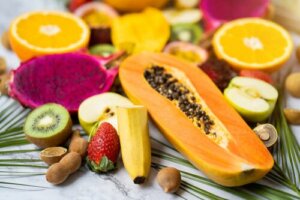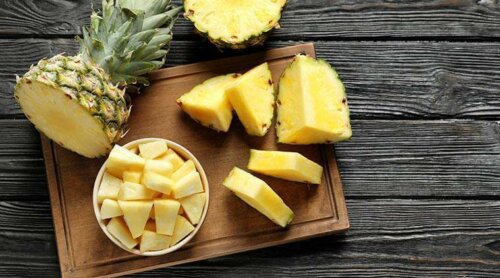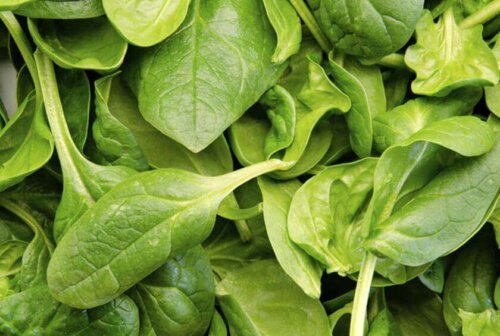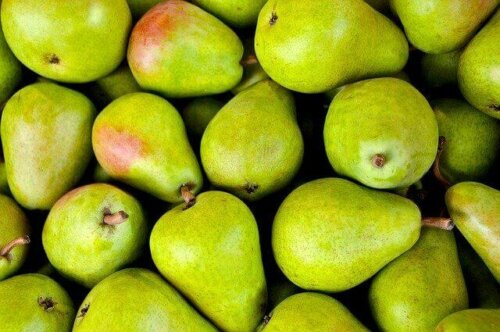Decrease Fluid Retention with Fruit and Vegetables


Written and verified by the pedagogue in physical education and nutritionist Elisa Morales Lupayante
A proper daily diet is essential for many reasons; for one, it helps decrease fluid retention.
There are several types of fruit and vegetables that contain a high percentage of water and fiber. Thus, they’re excellent allies in the elimination of retained fluids.
Fruit and vegetables can help decrease fluid retention
The best diuretic is water, no doubt. Surely you’ve heard that it’s drinking enough of it every day is essential. Not two quarts necessarily but more than two glasses a day at least. Julio Basulto, an expert in diet and nutrition, advises drinking it when you’re thirsty, especially during the summer.
However, you must take into account that you can also obtain it from food. In fact, this is one of the reasons why you must consume several pieces of fruit a day. Fruit doesn’t only provide many nutrients to your body but also water.
Many types of fruit and vegetables are on the list of diuretics. This is because they contain a large amount of water. You promote the production of urine when you consume them and, therefore, stimulate the production of urine.
At the same time, the consumption of these foods supports kidney function, so they’re great in this regard.
Don’t miss this article Try This Incredible 14-Day Plan for Full-Body Detox
1. Pineapple

Pineapple is a delicious fruit with high water content. According to data from the Spanish Nutrition Foundation, it contains iodine, vitamin C, organic acids, and bromelain, an enzyme that helps with digestion.
2. Tomato
This is a high water content fruit that also contains protein, carotenoids, and vitamin C. Thus, it’s considered a good option to promote the elimination of retained liquids.
3. Watermelon
95% of this fruit is water. According to data from the FEN, ‘you can’t highlight a nutrient as a “source” or “high content” but you can definitely highlight its contribution of potassium and vitamin A because it’s a great addition to a wholesome diet.’
Few things are more refreshing than a slice of this fruit during a summer afternoon. There are many ways to enjoy it though.
4. Eating spinach can decrease fluid retention

Spinach contains protein, fiber, iron, potassium, folate, vitamin C, A, E, and b-carotene. Thus, it doesn’t only contribute to cardiovascular health but can also help promote intestinal transit and promote urine production.
You can eat it raw in a salad and can also add it to smoothies and shakes. The important thing is to incorporate it into a balanced diet.
5. Cantaloupe
This is another fruit with high water content. According to data from the FEN, it contains potassium, vitamin C, and folates. Thus, it’s highly recommended for those with edema or water retention.
Discover Six Types of Food that Contain More Potassium than Bananas
6. Artichoke
This vegetable contains protein, fiber, phosphorus, potassium, sterols, and cynarine. Thus, it’s also a recommended option to counteract water retention. You must consume it as part of a healthy diet to benefit from its diuretic properties.
7. The consumption of apples helps decrease fluid retention
This fruit has a high content of dietary fiber and, to some extent, potassium and vitamin C, as well as flavonoids, procyanidins, and organic acids. Its regular consumption, whole and unprocessed, can help balance your intestinal transit and promote the expulsion of retained fluids.
8. Avocado
This fruit is well known as one of the best sources of omega 3 out there. Additionally, FEN experts point out it contains monounsaturated fatty acids, unsaturated fatty acids, potassium, and vitamins C, E, and B6.
9. Grapefruit
All citruses contain a good amount of water and can help people with edema expel retained fluids. In addition, they’re rich in vitamin C, the deficit of which can be the cause of fluid retention in some cases.
Along with grapefruit, nutritionists advise eating pomegranates, oranges, and tangerines at any time of day, but particularly at breakfast. This is for the purpose of nurturing your body soon after you get up.
10. Pears

This fruit is rich in fiber and water, just like apples, so it’s perfect for hydrating the body while eliminating retained liquids. In addition, it’s a source of potassium and vitamin C and thus a great addition to a wholesome diet.
Other types of fruit and vegetables to decrease fluid retention
There are many other types of produce rich in water and fiber such as papaya, asparagus, banana, parsley, black grapes, and celery.
Keep in mind that the best way to decrease fluid retention is to follow your doctor’s advice and maintain a healthy balanced diet that includes some of the fruit and vegetables mentioned above.
You will see how, little by little, you will begin to eliminate liquids in a natural way and feel better.
All cited sources were thoroughly reviewed by our team to ensure their quality, reliability, currency, and validity. The bibliography of this article was considered reliable and of academic or scientific accuracy.
- Kalantar-Zadeh, K., Regidor, D. L., Kovesdy, C. P., Van Wyck, D., Bunnapradist, S., Horwich, T. B., & Fonarow, G. C. (2009). Fluid retention is associated with cardiovascular mortality in patients undergoing long-term hemodialysis. Circulation. https://doi.org/10.1161/CIRCULATIONAHA.108.807362
- Farid Hossain, M. (2015). Nutritional Value and Medicinal Benefits of Pineapple. International Journal of Nutrition and Food Sciences. https://doi.org/10.11648/j.ijnfs.20150401.22
- Kane, G. C., & Lipsky, J. J. (2000). Drug-grapefruit juice interactions. Mayo Clinic Proceedings. https://doi.org/10.4065/75.9.933
This text is provided for informational purposes only and does not replace consultation with a professional. If in doubt, consult your specialist.








